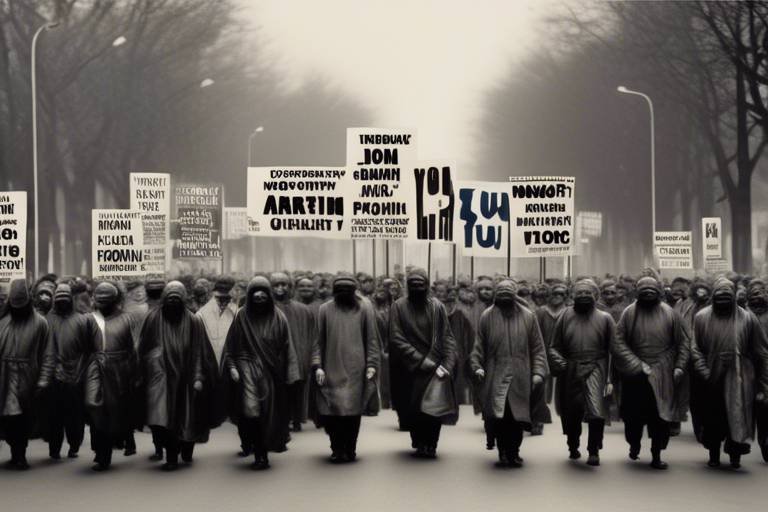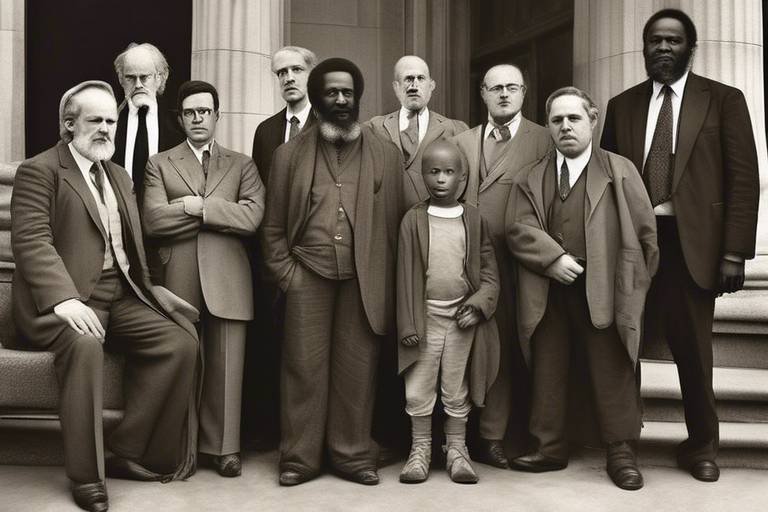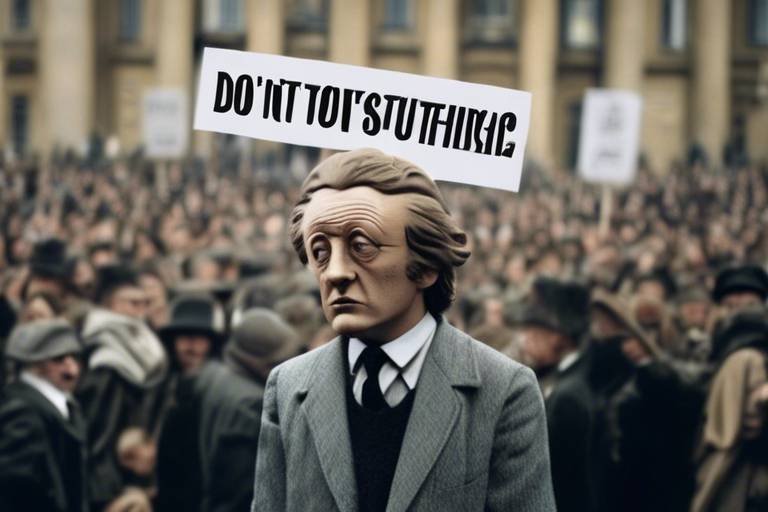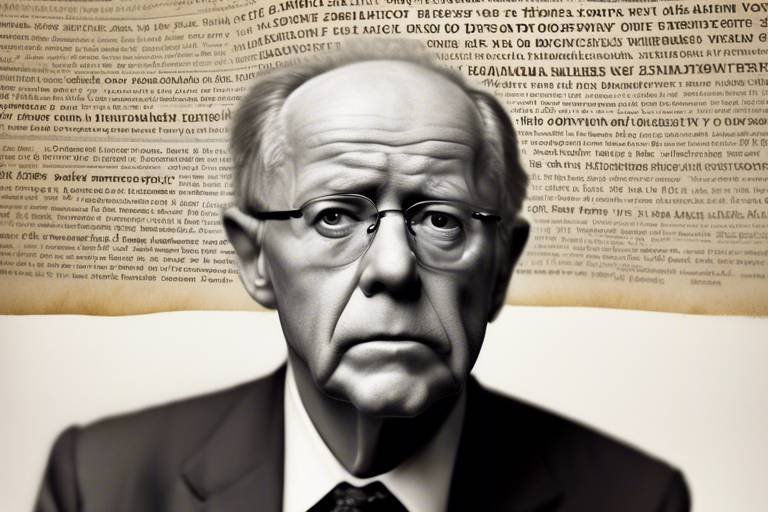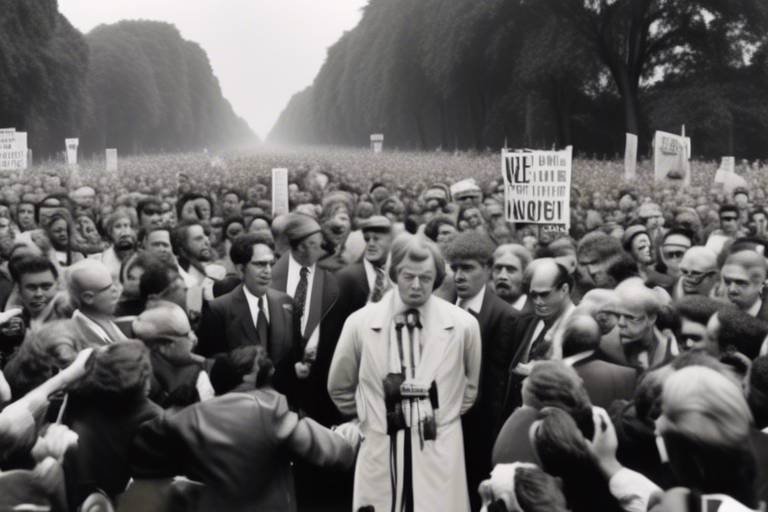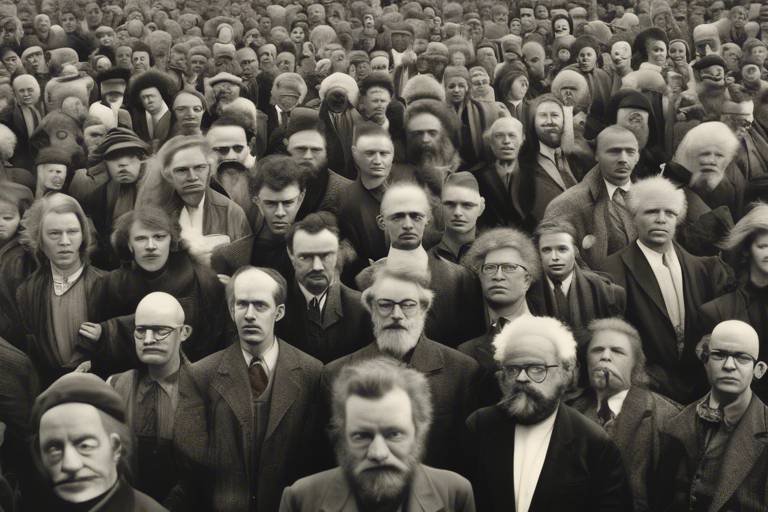Philosophy and Politics: Ethical Dilemmas
In the complex world of governance, the intersection of philosophy and politics unveils a tapestry woven with ethical dilemmas that challenge our moral compass. These dilemmas often arise when political leaders must make choices that pit one set of values against another, creating a battleground where the stakes are nothing less than the welfare of society. Imagine a tightrope walker, balancing precariously between competing ideals—this is the essence of political decision-making in the face of ethical conflicts.
At its core, an ethical dilemma is a situation where one must choose between conflicting moral principles, often leading to a conundrum that weighs heavily on the conscience. For instance, a politician may grapple with the decision to implement policies that benefit the majority but may marginalize a minority group. How do they navigate this moral maze? The answer lies in a deep understanding of the ethical frameworks that guide their choices.
As we delve deeper into the relationship between philosophy and politics, it becomes clear that ethical dilemmas are not merely theoretical constructs; they are real challenges faced by those in power. Consider the question: Should a government prioritize economic growth over environmental protection? This dilemma encapsulates the struggle between short-term gains and long-term sustainability, forcing leaders to confront their values and the implications of their decisions.
The importance of recognizing these ethical dilemmas cannot be overstated. They serve as a reminder that political decisions are rarely black and white. Instead, they exist in a spectrum of gray areas where the right choice is often obscured by competing interests and values. By exploring the philosophical underpinnings of these dilemmas, we can equip ourselves with the tools necessary to engage in informed discussions about governance and ethics.
In the following sections, we will explore various philosophical theories, such as utilitarianism and deontological ethics, and their implications for political thought and practice. We will also examine real-world case studies that highlight the ethical dilemmas faced by politicians and policymakers. Through this exploration, we aim to illuminate the intricate dance between philosophy and politics, revealing how ethical considerations shape our world.
- What are ethical dilemmas in politics? Ethical dilemmas in politics occur when political leaders face conflicting moral principles, requiring them to make difficult choices that can impact society.
- How does utilitarianism influence political decisions? Utilitarianism advocates for actions that promote the greatest good for the greatest number, which can lead to complex ethical challenges in governance.
- What role does deontological ethics play in political governance? Deontological ethics emphasizes the importance of duty and adherence to moral rules, guiding political leaders in making principled decisions.

The Nature of Ethical Dilemmas
Ethical dilemmas are like a complex web of choices where moral principles clash, making it incredibly challenging for individuals to navigate through the murky waters of right and wrong. Imagine standing at a crossroads, where each path represents a different value or principle. Choosing one path often means sacrificing another, and this is where the real struggle begins. In politics, these dilemmas become even more pronounced, as decision-makers must weigh the implications of their choices not just for themselves, but for entire communities and nations.
At the heart of ethical dilemmas lies the conflict between competing values. For instance, a politician may face a situation where they must choose between the welfare of the majority and the rights of a minority. This is not merely a theoretical exercise; it’s a real-world challenge that can have profound consequences. The decisions made in these moments can lead to significant social change or, conversely, to deep divisions within society. Thus, understanding ethical dilemmas is not just an academic pursuit; it's essential for effective governance and political leadership.
To illustrate the nature of ethical dilemmas, consider the following core components:
- Conflict of Values: Ethical dilemmas often arise from a clash of values, such as justice versus mercy, or individual rights versus collective good. Each choice carries its own set of consequences.
- Consequentialism vs. Deontology: The debate between these two ethical frameworks complicates decision-making. Should one focus on the outcomes of actions (consequentialism), or adhere strictly to moral rules (deontology)?
- Stakeholder Impact: Decisions made in political contexts affect various stakeholders, including citizens, businesses, and even international relations. Balancing these interests is a daunting task.
These components highlight why ethical dilemmas are so prevalent in politics. Politicians are often seen as the architects of societal norms and values, yet the choices they make can sometimes seem contradictory or even hypocritical. For example, a government might implement policies aimed at reducing poverty while simultaneously enacting measures that benefit the wealthy. This dissonance can lead to public distrust and cynicism towards political institutions.
Moreover, ethical dilemmas are not static; they evolve with cultural, social, and technological changes. What was once considered an ethical norm can quickly become outdated as society's values shift. This fluidity makes it imperative for politicians and policymakers to remain vigilant and adaptable, continuously reassessing their moral compass in light of new information and societal expectations.
In conclusion, the nature of ethical dilemmas in politics is a multifaceted issue that requires careful consideration and a deep understanding of moral principles. As we explore the historical perspectives and real-world implications of these dilemmas in the following sections, it's crucial to remember that the choices made by political leaders resonate far beyond their immediate context, shaping the ethical landscape for generations to come.

Historical Perspectives
Throughout the ages, the interplay between philosophy and politics has been a subject of intense scrutiny and debate. Philosophers from various epochs have sought to understand the ethical dilemmas that arise within the political sphere, shaping the way we perceive governance and moral responsibility. From the ancient Greeks to modern thinkers, the evolution of political thought has been deeply influenced by ethical considerations. This exploration is not merely academic; it serves as a guide for current and future leaders navigating the complex waters of political decision-making.
One of the earliest philosophers to address these dilemmas was Plato. In his works, particularly in "The Republic," he pondered the ideal state and the role of justice within it. Plato argued that a just society could only be achieved if its rulers were philosophers, individuals who possess wisdom and virtue. This idea underscores a fundamental ethical dilemma: should political leaders prioritize the good of the state or the welfare of its citizens? Plato's vision raises questions about the nature of leadership and the moral obligations of those in power.
Fast forward to the Enlightenment, where thinkers like John Locke and Jean-Jacques Rousseau introduced concepts of social contracts and individual rights. Locke's belief in natural rights—life, liberty, and property—challenged the divine right of kings and emphasized the importance of consent in governance. Rousseau, on the other hand, highlighted the tension between individual freedom and collective responsibility, arguing that true freedom is found in adherence to the general will. These perspectives not only shaped political theory but also ignited ethical dilemmas regarding the balance between authority and individual rights.
In the 19th century, the rise of utilitarianism brought forth a new wave of ethical considerations in politics. Thinkers like Jeremy Bentham and John Stuart Mill proposed that the morality of an action is determined by its outcome, advocating for policies that promote the greatest happiness for the greatest number. However, this utilitarian approach is fraught with challenges. For instance, what happens when the needs of the majority infringe upon the rights of the minority? This question continues to resonate in contemporary political discourse, highlighting the ongoing relevance of historical philosophical debates.
Moreover, the 20th century introduced new dimensions to these ethical dilemmas with the advent of deontological ethics, primarily through the work of Immanuel Kant. Kant argued that morality is grounded in duty and adherence to universal moral laws, regardless of the consequences. This perspective raises critical questions for politicians: Should they act based on the outcomes of their decisions, or should they adhere strictly to ethical principles? The tension between these two approaches remains a cornerstone of political ethics today.
To further illustrate the impact of these philosophical perspectives, consider the following table that summarizes key philosophers and their contributions to political ethics:
| Philosopher | Key Contribution | Ethical Dilemma Addressed |
|---|---|---|
| Plato | Philosopher-Kings | Justice vs. Power |
| John Locke | Natural Rights | Individual Rights vs. Authority |
| Jean-Jacques Rousseau | Social Contract | Individual Freedom vs. Collective Good |
| Jeremy Bentham | Utilitarianism | Majority Good vs. Minority Rights |
| Immanuel Kant | Deontological Ethics | Duty vs. Consequences |
In summary, the historical perspectives on the relationship between philosophy and politics reveal a rich tapestry of ethical dilemmas that continue to challenge political leaders today. By reflecting on the ideas of past philosophers, we can better understand the complexities of governance and the moral responsibilities that come with it. As we navigate our current political landscape, these philosophical insights remain invaluable, prompting us to ask ourselves: How do we balance our ethical obligations with the practicalities of political life?
- What is an ethical dilemma in politics? An ethical dilemma in politics occurs when a decision involves conflicting moral principles, requiring a choice that may favor one value over another.
- How have historical philosophers influenced modern political thought? Historical philosophers have laid the groundwork for contemporary political theories, addressing issues such as justice, rights, and the role of government, which continue to inform current debates.
- What are the main ethical theories relevant to politics? The main ethical theories include utilitarianism, which focuses on outcomes; deontological ethics, which emphasizes duty; and virtue ethics, which centers on moral character.

Utilitarianism in Politics
Utilitarianism, a philosophical theory championed by thinkers like Jeremy Bentham and John Stuart Mill, is grounded in the idea that the best action is the one that maximizes overall happiness or utility. In the realm of politics, this principle can be both a guiding light and a source of ethical dilemmas. Imagine a government faced with a decision that could benefit the majority but harm a minority. Should the leaders prioritize the happiness of the many over the suffering of the few? This question encapsulates the core tension of utilitarianism in political decision-making.
One of the primary strengths of utilitarianism in politics is its straightforward approach to assessing the consequences of actions. By evaluating policies based on their outcomes, politicians can strive for decisions that promote the greatest good. For instance, consider a public health initiative aimed at reducing smoking rates. A utilitarian perspective would support measures such as higher taxes on tobacco products or strict advertising regulations, as these actions can lead to significant health benefits for the population at large.
However, the application of utilitarianism is fraught with challenges. Critics argue that it can justify morally questionable actions, as it may overlook the rights of individuals in favor of the collective. For example, if a government decides to implement a policy that sacrifices the rights of a small group to benefit a larger population, it raises serious ethical concerns. This brings us to a crucial point: while seeking the greatest good, utilitarianism can sometimes lead to the neglect of justice and fairness.
To further illustrate these complexities, let’s examine a few case studies where utilitarianism played a pivotal role in political decision-making:
| Case Study | Description | Utilitarian Outcome |
|---|---|---|
| Health Care Reform | Implementation of a universal health care system | Increased overall health and well-being for the majority, but potential loss of quality for some. |
| War Decisions | Justifying military intervention for humanitarian reasons | Saving lives in one region at the potential cost of lives in another. |
| Surveillance Policies | Increased surveillance for national security | Enhanced security for the majority, but invasion of privacy for individuals. |
These examples reveal the inherent tension in utilitarianism: while aiming for the greatest good, the potential fallout for minority groups can lead to significant ethical dilemmas. Politicians must grapple with the consequences of their decisions, often walking a tightrope between benefiting the majority and respecting individual rights.
As we navigate the murky waters of political ethics, it becomes essential to ask: can utilitarianism truly coexist with a commitment to justice? Or does the pursuit of the greater good inevitably sacrifice the rights of the few? These questions remain central to the ongoing discourse on the role of utilitarianism in politics, highlighting the need for a balanced approach that considers both outcomes and moral imperatives.
Ultimately, the challenge lies in finding a way to integrate utilitarian principles with other ethical frameworks, ensuring that political decisions reflect not just the majority's desires but also uphold the dignity and rights of every individual. This delicate balance is crucial for fostering a just and equitable society.
- What is utilitarianism? Utilitarianism is a moral theory that suggests that the best action is the one that maximizes overall happiness or utility.
- How does utilitarianism apply to politics? In politics, utilitarianism is used to evaluate policies based on their consequences for the majority, often leading to ethical dilemmas regarding minority rights.
- What are some critiques of utilitarianism? Critics argue that utilitarianism can justify immoral actions if they benefit the majority, potentially leading to the neglect of justice and individual rights.
- Can utilitarianism coexist with other ethical frameworks? Yes, integrating utilitarian principles with other ethical considerations can help create a more balanced approach to political decision-making.

Case Studies in Utilitarianism
Utilitarianism, a philosophical framework that promotes actions leading to the greatest happiness for the greatest number, finds itself at the heart of many political decisions. To truly understand its impact, we can delve into several case studies that showcase both its effectiveness and its ethical quandaries. One of the most notable examples is the decision-making process during wartime. Leaders often face the harsh reality of choosing between the lives of soldiers and civilians, weighed against the potential for a more significant peace. This dilemma raises the question: How do we measure the value of one life against many?
Another compelling case study involves the allocation of healthcare resources. In a system where resources are limited, policymakers must decide how to distribute care effectively. Should they prioritize treatments that benefit the majority, even if it means neglecting specialized care for a few? Here, utilitarianism suggests that maximizing overall health benefits is the way to go, but at what cost to individual rights and needs? The tension between collective good and individual care presents a classic ethical dilemma.
Let’s take a closer look at a few real-world examples:
| Case Study | Utilitarian Decision | Outcome |
|---|---|---|
| World War II Bombing of Dresden | Targeting civilian areas to hasten the end of the war | Massive civilian casualties but a swift conclusion to the conflict |
| COVID-19 Vaccine Distribution | Prioritizing essential workers and vulnerable populations | Saved lives and reduced strain on healthcare systems |
| Resource Allocation in Healthcare | Funding treatments for the most common diseases | Improved overall public health but left rare diseases underfunded |
These examples illustrate how utilitarianism can guide political leaders in making tough decisions, but they also highlight the potential for significant moral fallout. The bombing of Dresden, for instance, was justified under the premise of ending the war quickly, yet it resulted in countless civilian deaths. This raises an important critique of utilitarianism: can we truly justify actions that lead to harm, even if they are intended to produce a greater good?
Moreover, the COVID-19 pandemic provided a unique lens through which to view utilitarian principles in action. The prioritization of vulnerable populations for vaccination was a decision rooted in utilitarian ethics, aiming to protect those most at risk and, in turn, the broader community. However, this approach also sparked debates about fairness and equity in healthcare, as some argued that it marginalized other groups.
In conclusion, while utilitarianism offers a pragmatic approach to ethical dilemmas in politics, it is not without its challenges. The balance between achieving the greatest good and respecting individual rights remains a contentious issue. As we analyze these case studies, it becomes evident that political leaders must navigate these waters carefully, weighing both the immediate outcomes and the long-term implications of their decisions.
- What is utilitarianism? Utilitarianism is a moral philosophy that advocates for actions that maximize happiness or well-being for the greatest number of people.
- How does utilitarianism apply to politics? In politics, utilitarianism is used to justify decisions that aim to produce the best overall outcomes for society, often in complex situations like war or resource distribution.
- What are some criticisms of utilitarianism? Critics argue that utilitarianism can overlook individual rights and lead to morally questionable decisions, as it prioritizes the majority's happiness over the minority's suffering.

Critiques of Utilitarianism
Utilitarianism, while appealing in its straightforward approach to maximizing happiness, faces several critiques that challenge its viability as a guiding ethical framework in politics. One of the primary concerns is its potential to justify morally questionable actions if they lead to a perceived greater good. For instance, imagine a scenario where sacrificing a few individuals could save a larger group. Utilitarianism might endorse this action, raising the question: is it really ethical to harm a few for the benefit of many?
Another significant critique revolves around the measurement of happiness. How do we quantify happiness? Different individuals have varying definitions of what constitutes happiness, making it incredibly challenging to apply utilitarian principles consistently. This subjectivity can lead to arbitrary decisions, where the happiness of one group is prioritized over another without a fair assessment of their needs and values.
Moreover, critics argue that utilitarianism often overlooks the importance of individual rights. In the pursuit of the greatest good, the rights of minorities can be trampled upon. This is particularly evident in political scenarios where the majority's desires overshadow the fundamental rights of the few. For example, if a government decides to implement policies that benefit the majority but severely restrict the rights of a minority group, it raises ethical concerns about justice and fairness.
Additionally, utilitarianism can lead to a slippery slope of ethical decision-making. Once we start justifying actions based on outcomes, it becomes increasingly difficult to draw the line. This could potentially lead to a scenario where any action, no matter how heinous, could be justified if it results in a favorable outcome. Such a perspective can erode the moral fabric of society, as actions are evaluated solely on their consequences rather than their inherent morality.
In summary, while utilitarianism offers a compelling framework for decision-making in politics, its critiques highlight significant limitations. The potential to justify harmful actions, the challenges in measuring happiness, the risk of infringing on individual rights, and the slippery slope of ethical reasoning pose serious questions about its applicability in real-world governance. As political leaders navigate complex ethical landscapes, these critiques serve as essential considerations for more balanced and equitable decision-making.
- What is utilitarianism? Utilitarianism is an ethical theory that suggests that the best action is the one that maximizes overall happiness or utility.
- What are the main critiques of utilitarianism? The main critiques include its potential to justify morally questionable actions, difficulties in measuring happiness, overlooking individual rights, and leading to a slippery slope in ethical decision-making.
- How does utilitarianism apply to politics? Utilitarianism can influence political decisions by advocating for policies that aim to achieve the greatest good for the greatest number, but it also raises ethical dilemmas regarding individual rights and justice.
- Can utilitarianism coexist with other ethical theories? Yes, many argue that a pluralistic approach, which incorporates elements from various ethical theories, can provide a more comprehensive framework for ethical decision-making in politics.

Deontological Ethics and Governance
When we talk about deontological ethics, we’re diving into a realm that prioritizes duty and moral rules over the consequences of actions. Imagine a world where decisions are made based solely on adherence to ethical norms, regardless of the potential outcomes. This perspective is not just theoretical; it has profound implications for governance and political decision-making. Deontological ethics, pioneered by philosophers like Immanuel Kant, posits that certain actions are inherently right or wrong, and this moral framework can guide politicians in navigating the murky waters of ethical dilemmas.
In the realm of governance, deontological ethics challenges leaders to uphold their duties even when faced with difficult choices. For instance, a politician may encounter a situation where they must decide between adhering to a campaign promise or compromising that promise for a greater good. The deontological approach would advocate for keeping the promise, emphasizing the importance of integrity and trustworthiness in political office. This unwavering commitment to ethical principles can foster a sense of trust among constituents, reinforcing the idea that politicians are accountable to a higher moral standard.
However, the application of deontological ethics in governance is not without its challenges. One significant dilemma arises when duties conflict. Consider the scenario where a government must decide whether to prioritize national security over individual rights. A deontologist might argue that protecting citizens' rights is a fundamental duty, while others might contend that the government has a duty to ensure safety, even at the expense of certain freedoms. This tug-of-war between competing duties can lead to a paralysis of decision-making, leaving leaders in a quandary.
To illustrate this further, let’s look at some key principles of deontological ethics as they apply to governance:
| Principle | Description |
|---|---|
| Universalizability | The idea that actions should be applicable to everyone in similar situations. |
| Respect for Persons | Individuals should be treated as ends in themselves, not merely as means to an end. |
| Duty to Act | Emphasis on the obligation to act according to moral laws and duties. |
These principles guide politicians in making decisions that align with ethical standards, but they also raise important questions about the nature of governance. For example, how do leaders balance their duties to their constituents with their responsibilities to the broader society? This is where the complexity of deontological ethics becomes evident. While it provides a strong framework for maintaining ethical integrity, it can also lead to conflicts that require nuanced understanding and careful deliberation.
In conclusion, deontological ethics serves as a vital compass for governance, encouraging politicians to act on principles of duty and morality. Yet, the ethical dilemmas that arise from conflicting duties highlight the challenges of implementing these principles in the real world. As we navigate the intricate landscape of politics, the insights from deontological ethics remind us of the importance of maintaining a steadfast commitment to ethical standards, even when the path is fraught with challenges.
- What is deontological ethics? Deontological ethics is a moral philosophy that emphasizes the importance of duty and adherence to moral rules.
- How does deontological ethics apply to politics? It guides politicians to make decisions based on ethical principles rather than the consequences of their actions.
- What are some challenges of applying deontological ethics in governance? Conflicting duties and the need to balance individual rights with collective security can complicate decision-making.

Real-World Ethical Dilemmas
In the realm of politics, ethical dilemmas are not mere academic exercises; they are the very fabric of decision-making that impacts lives and shapes societies. Imagine standing at a crossroads where every path you take could lead to vastly different outcomes, each with its own set of moral implications. This is the reality for politicians and policymakers who often find themselves grappling with choices that test their ethical boundaries. The weight of these decisions can feel like carrying a mountain on one’s shoulders, especially when the stakes involve human rights, national security, or the welfare of millions.
Take, for example, the ethical dilemma surrounding war and peace. Leaders are frequently faced with the question: should they engage in military action to protect national interests, or should they prioritize humanitarian concerns, risking the safety of their citizens? The moral implications of war can be staggering. On one hand, there’s the responsibility to protect one’s nation; on the other, there’s the duty to uphold human rights and prevent unnecessary suffering. This dilemma is not just theoretical; it has real-world consequences that can lead to loss of life, displacement of populations, and long-lasting geopolitical tensions.
Another significant area of ethical dilemmas in politics is social justice. The challenge of addressing inequality while maintaining political stability is like walking a tightrope. Politicians must navigate the delicate balance between implementing policies that promote equity and ensuring they do not alienate segments of the population. For instance, consider the debate around welfare programs. While such programs can alleviate poverty and promote social equity, they can also lead to accusations of dependency and misuse of resources. Thus, the ethical question arises: how do we support those in need without fostering a culture of reliance?
Moreover, the political landscape is often littered with issues that require a careful examination of ethical principles. For instance, environmental policies present a dilemma where the immediate economic benefits of industrial growth may clash with the long-term sustainability of our planet. Politicians must ask themselves: should they prioritize short-term gains that benefit their constituents, or should they champion policies that protect the environment for future generations, even if it means making unpopular decisions today?
To illustrate these dilemmas further, let’s consider a few real-world examples:
| Case Study | Ethical Dilemma | Outcome |
|---|---|---|
| War in Iraq (2003) | National security vs. humanitarian intervention | Controversial military action led to long-term instability |
| Healthcare Reform | Universal coverage vs. cost control | Divided public opinion, ongoing debates |
| Climate Change Agreements | Economic growth vs. environmental protection | International cooperation with mixed results |
These examples highlight that ethical dilemmas in politics are complex and multifaceted. They require not only a deep understanding of moral philosophy but also a keen awareness of the socio-political context in which these dilemmas arise. Politicians must often make choices that involve trade-offs, where no option is devoid of ethical repercussions. The challenge lies in making decisions that, while perhaps not perfect, strive to reflect the values of justice, equality, and respect for human dignity.
- What is an ethical dilemma? An ethical dilemma is a situation where a person faces conflicting moral principles, making it challenging to choose the right course of action.
- How do ethical dilemmas affect political decision-making? Ethical dilemmas can complicate political decisions, as leaders must weigh the consequences of their choices on various stakeholders.
- Can ethical dilemmas be resolved easily? No, ethical dilemmas are often complex and do not have straightforward solutions; they require careful consideration and sometimes compromise.
- Why is understanding ethical dilemmas important in politics? Understanding these dilemmas is crucial for making informed and responsible decisions that align with democratic values and public welfare.

Case Study: War and Peace
The moral implications of war raise significant ethical questions that challenge the very fabric of political decision-making. Imagine standing at a crossroads where one path leads to peace and the other to war; which would you choose? This dilemma is not just theoretical; it is a harsh reality faced by leaders across the globe. When national interests clash with humanitarian concerns, the stakes are incredibly high, and the consequences of decisions can resonate for generations.
Throughout history, leaders have grappled with the decision to go to war or to pursue diplomatic solutions. The ethical considerations often revolve around the principles of utilitarianism—seeking the greatest good for the greatest number—and deontological ethics, which emphasizes duty and moral rules. For instance, during World War II, the decision to use atomic bombs on Hiroshima and Nagasaki was justified by some as a means to end the war swiftly and save lives in the long run. However, this decision was met with fierce criticism, as it resulted in immense civilian suffering and raised questions about the morality of sacrificing a few for the supposed greater good.
To further illustrate this ethical quagmire, consider the following table that outlines various scenarios where leaders faced the war versus peace dilemma:
| Scenario | Decision Made | Ethical Implications |
|---|---|---|
| World War II: Atomic Bombings | Utilization of atomic bombs | Justified by some as a means to end the war quickly, but resulted in massive civilian casualties. |
| Vietnam War | Escalation of military involvement | Debate over whether the cost in human lives was worth the political objectives. |
| Rwandan Genocide | Failure to intervene | Ethical dilemma of inaction versus the political ramifications of intervention. |
These historical examples underscore the complexity of the ethical dilemmas that arise when making decisions about war and peace. Leaders must weigh the potential benefits of military action against the moral cost of human lives. Additionally, the question of whether to intervene in conflicts abroad often leads to heated debates about national sovereignty, humanitarian responsibility, and the role of international organizations.
Furthermore, the aftermath of war poses its own set of ethical challenges. Post-war reconstruction efforts often require significant resources, and the question arises: should nations prioritize their own recovery, or should they assist in rebuilding war-torn societies? Balancing national interests with moral obligations creates a convoluted landscape in which leaders must navigate both political and ethical responsibilities. As we consider these dilemmas, it becomes evident that the relationship between war and peace is fraught with ethical complexities that demand careful consideration and profound empathy.
- What are the main ethical dilemmas in war? Ethical dilemmas in war include the justification of military action, the protection of civilian lives, and the moral implications of using weapons of mass destruction.
- How do leaders decide between war and peace? Leaders often weigh national interests against humanitarian concerns, considering the potential consequences of their actions on both a domestic and global scale.
- Can war ever be justified? While some argue that war can be justified in cases of self-defense or to prevent greater harm, others maintain that peaceful solutions should always be pursued first.

Social Justice Issues
Social justice is not just a buzzword; it’s a vital concept that resonates deeply within the fabric of our society. It encompasses a broad range of ethical dilemmas that politicians and policymakers face daily. Imagine walking a tightrope, where on one side lies the need for equality and the other, the harsh realities of political stability. This delicate balance is what makes social justice issues so complex. Politicians often find themselves in situations where they must weigh the needs of marginalized communities against the potential backlash from other segments of the population. It’s a classic case of trying to please everyone, but as we know, that’s an impossible task.
One of the primary challenges in addressing social justice is the **persistent inequality** that exists in many forms, including economic disparity, racial injustice, and gender inequality. These issues are not just theoretical; they manifest in real-world scenarios that require immediate attention. For instance, consider the following statistics:
| Type of Inequality | Percentage of Affected Population |
|---|---|
| Income Inequality | 20% |
| Racial Discrimination | 30% |
| Gender Pay Gap | 25% |
These figures highlight the urgent need for policies that promote equity and justice. However, implementing such policies can lead to significant ethical dilemmas. For instance, when a government decides to increase taxes on the wealthy to fund social programs, they might face backlash from affluent citizens who argue that their rights are being infringed upon. On the other hand, failing to address the needs of the underprivileged could perpetuate cycles of poverty and disenfranchisement. It’s a classic case of a **no-win situation**, where every decision has its consequences.
Moreover, the concept of social justice is often intertwined with public opinion. Politicians must navigate the tricky waters of public sentiment, which can fluctuate wildly. What may seem like a just cause today could be met with resistance tomorrow. This unpredictability makes it challenging to advocate for policies that promote social justice. For example, the push for **universal healthcare** is often met with fierce debate. Advocates argue that healthcare is a fundamental right, while opponents raise concerns about the financial implications and the potential for decreased quality of care. This tug-of-war between ethical imperatives and practical realities is what makes social justice a hot-button issue.
Ultimately, the pursuit of social justice requires a nuanced understanding of the various stakes involved. It’s about finding a middle ground where the needs of the many do not overshadow the rights of the few. As we move forward, it’s crucial for policymakers to engage in open dialogues with communities, listen to their concerns, and strive for solutions that are both ethical and practical. Only then can we hope to create a society that truly embodies the principles of social justice.
- What is social justice? Social justice is the fair distribution of resources, opportunities, and privileges within a society, aiming to create equality for all individuals.
- Why are social justice issues important in politics? They are crucial because they address systemic inequalities that affect people's lives and wellbeing, influencing political stability and societal harmony.
- How can policymakers effectively address social justice issues? By engaging with communities, promoting inclusive policies, and balancing competing interests to ensure fair treatment for all.
Frequently Asked Questions
- What are ethical dilemmas in politics?
Ethical dilemmas in politics arise when decision-makers face situations where moral principles conflict. This means they must choose between competing values, often leading to challenging choices that can impact society in profound ways. Understanding these dilemmas is crucial for anyone involved in political decision-making.
- How does utilitarianism influence political decisions?
Utilitarianism, which promotes the idea of the greatest good for the greatest number, plays a significant role in shaping political decisions. It encourages leaders to weigh the outcomes of their actions based on overall happiness or benefit. However, it can also lead to morally questionable outcomes, especially when the rights of minorities are overlooked for the sake of the majority.
- What are some critiques of utilitarianism in politics?
Critics argue that utilitarianism can justify harmful actions if they benefit a larger group. This raises ethical concerns about sacrificing individual rights for collective gain. Such critiques highlight the potential dangers of prioritizing outcomes over moral duties, emphasizing the need for a balanced approach in political ethics.
- How does deontological ethics apply to governance?
Deontological ethics focuses on adherence to moral rules and duties, which directly influences governance. Politicians and policymakers guided by these principles prioritize their obligations to uphold justice and rights, even when it conflicts with popular opinion or potential benefits. This approach encourages a more principled form of leadership.
- Can you give examples of real-world ethical dilemmas faced by politicians?
Absolutely! Politicians often grapple with dilemmas such as the decision to go to war, where they must balance national interests with humanitarian concerns. Social justice issues also pose significant challenges, as leaders strive to address inequality while maintaining political stability and public support. These scenarios illustrate the complexities of ethical decision-making in politics.
- What is the significance of studying historical perspectives on ethical dilemmas?
Studying historical perspectives on ethical dilemmas helps us understand how philosophical theories have shaped political thought and practice over time. By examining past decisions and their consequences, current and future leaders can learn valuable lessons about the implications of their choices and the ethical frameworks that guide them.




